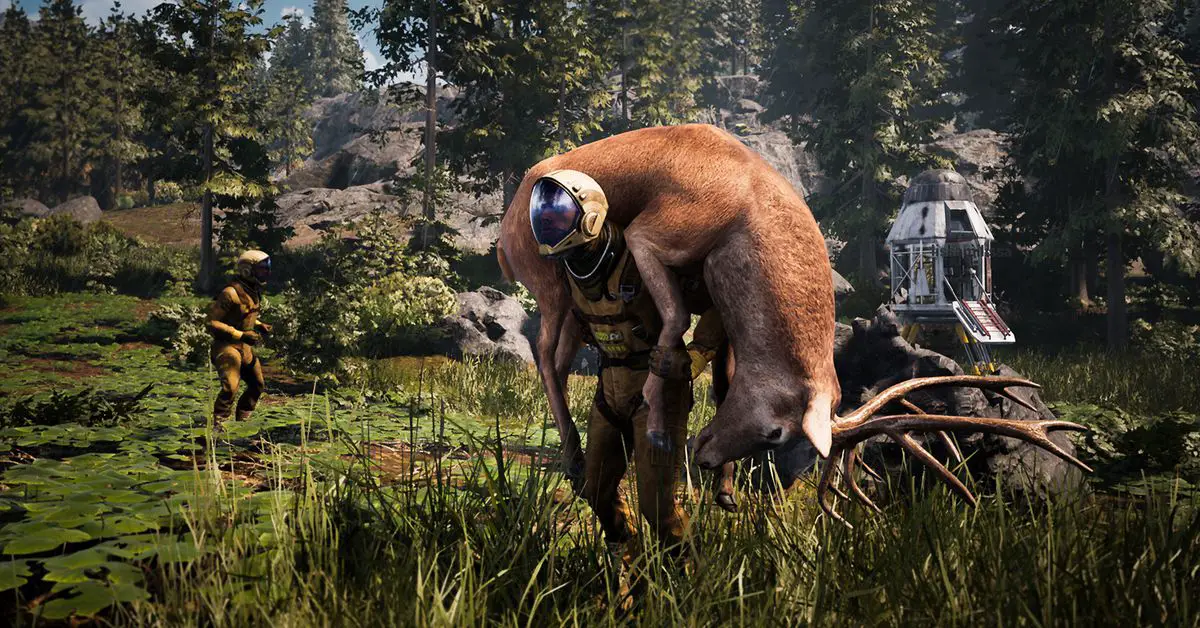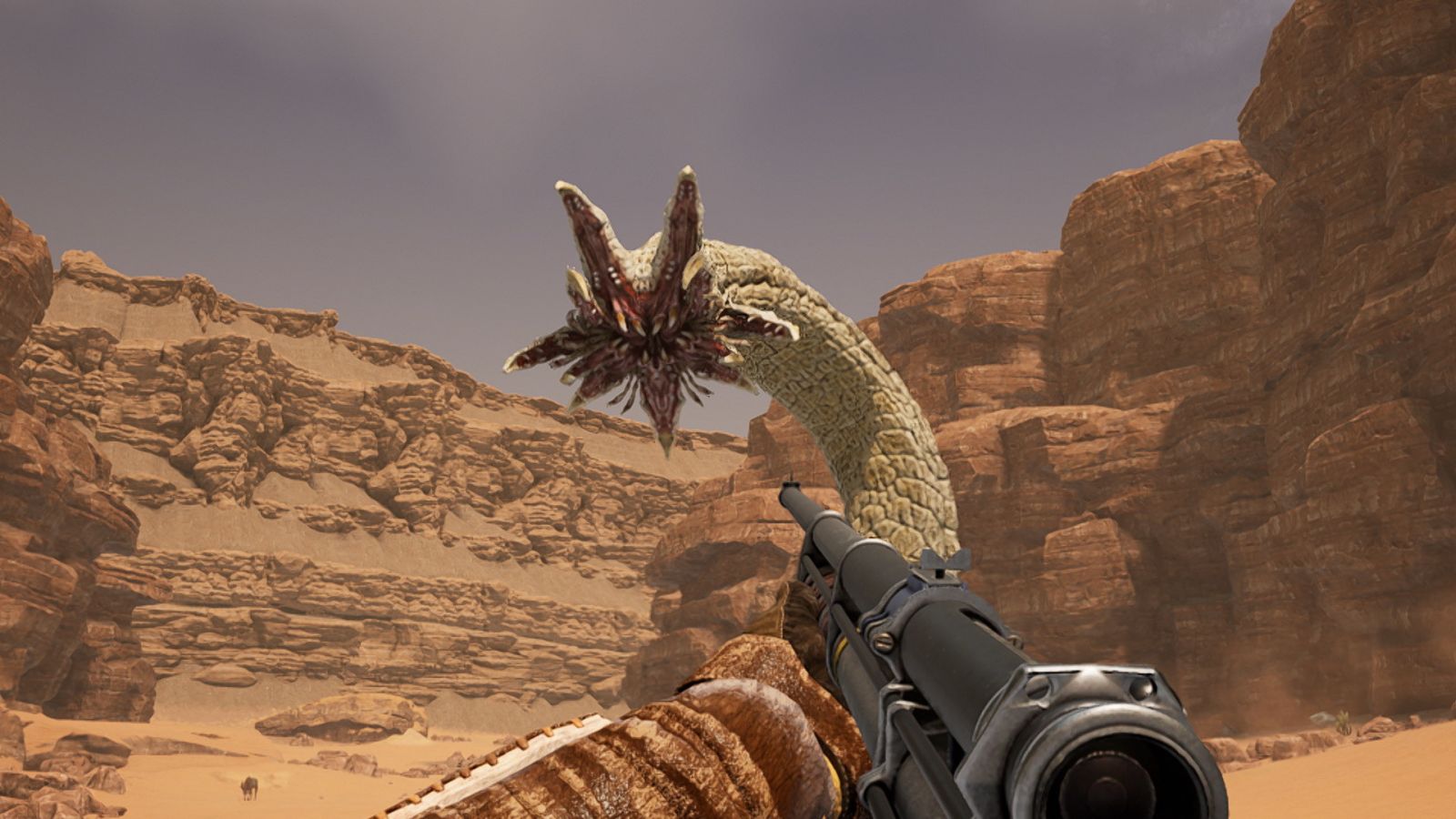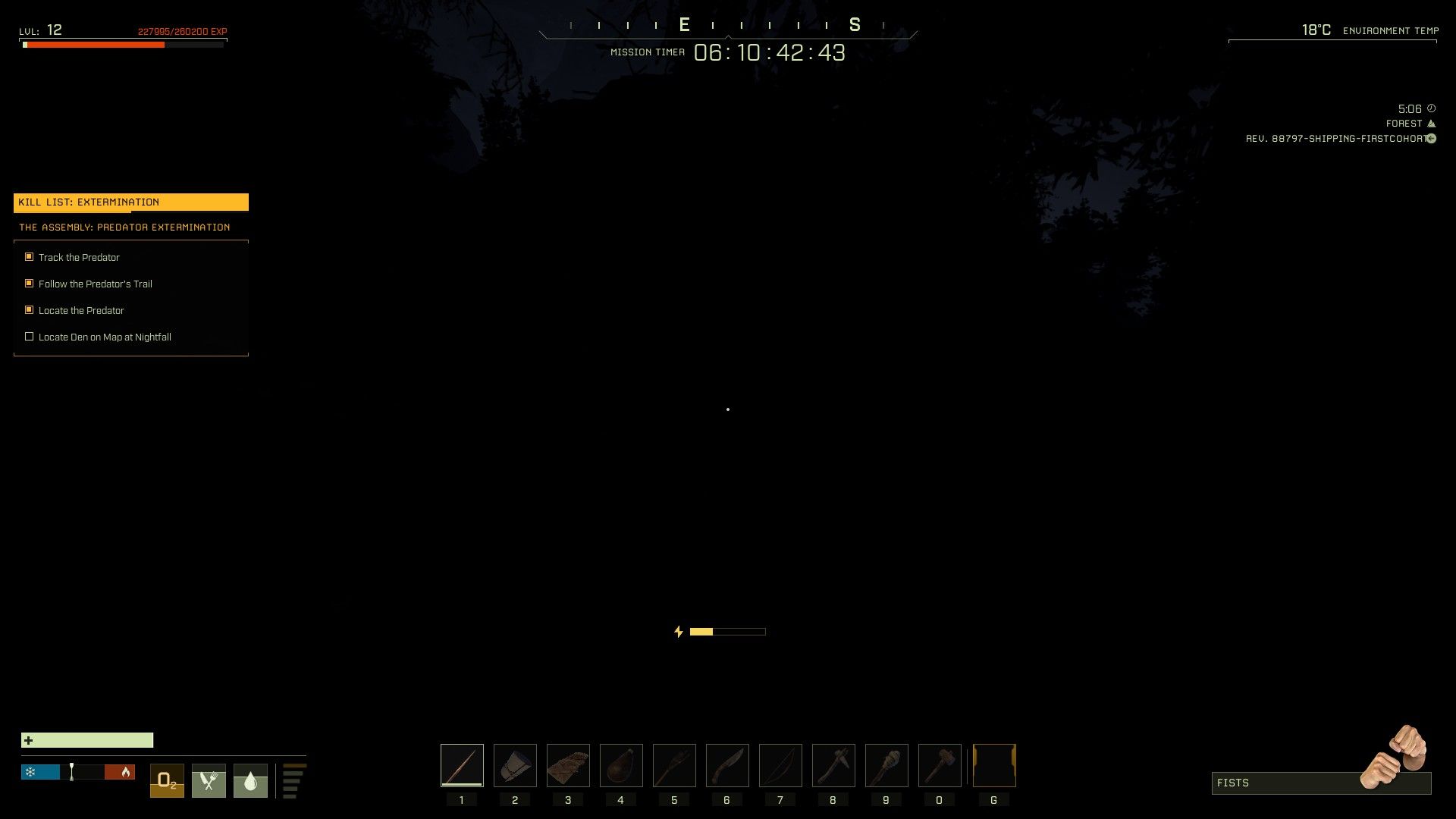
Huddled in the confines of our wooden structure, hammers banging, we try to hold the building together against the crash of the storm. Lightning lights up the night sky as a bolt rips into the roof. We gather up everything we can stuff into our pockets, swinging fire beaters at the now-raging inferno in vain. Watching our hard work go up in flames as we scramble to save our own skin we receive a harsh reminder — Icarus is not for the faint of heart. Shrugging, we start rebuilding. A cruel mistress, but it’s our fault. When the game gives you a lightning rod, it might be a hint.
Icarus falls squarely in the survival crafting genre, with equal emphasis on both. Descending from a space station to the planet with nothing more than a cheap envirosuit to slow down (but not stop) you from suffocating, you’ll be given just a few days to accomplish various missions before abandoning the settlement and rocketing back to the station to gear up for another trip to the surface. It’s what happens on the surface that is equal parts painful and magical.
When you start off in Icarus, you know nothing. No talents, and the most basic of caveman tools for blueprints are all you have in your arsenal. Like any good survival crafting game you’ll pick up sticks, rocks, and fiber from the ground where you can cobble together simple things like a sharpened stick, a rock knife, a pickaxe, and a basic wood cutting axe. Going up a level will grant you three points to spend on additional blueprints, as well as a single point to spend on talents, which we’ll get into later. Early blueprints are for things like a stone skinning knife, a campfire, and a bedroll. Next you’ll probably pick up thatched building components so you can get out of the elements — you’ll need a roof over your head, a campfire, and a bedroll to be able to sleep the night away. At this point you’ll probably realize that the beautiful weather caused you to skip the rag on a stick blueprint. It’s gonna be a long, dark night for you.
The rag on a stick example is just one of many “lessons” that Icarus will teach you. My first house made of wood instead of thatch was amazing, carefully crafted with pillars underneath to ensure it was stable, wooden skirts to keep any creatures from going underneath, and with scaffolding for archery. It burned to the ground while I laughed having eschewed the fire beater for what I thought were more important things like that rag on a stick. Well, it turns out the fire beater is extraordinarily important when, you know, things are on fire.
There is something odd, and I’ve not seen a canon reason for it – all the creatures you’ll encounter in Icarus are normal Earth animals. Polar Bears, wolves, rabbits, deer, and chamois — just to name a few of the creatures you’ll find on the planet’s surface. Despite being an alien world, there is no alien life. Even the plants are the same. Icarus was a chance to encounter dangerous new life on a dangerous new world – a missed opportunity.
The mission structure of Icarus is one of incremental improvements. The first missions ask you to do something simple like hit three survey points and then exfiltrate back to the station. Simple in and out. The next one has you hitting a few terrain zones for new potential drops zones. Once you do that one, though, the rest is up to you. The missions are laid out on a grid with little more than a cursory description, a level requirement as well as a skull rating, and a difficulty ranking of easy, normal, hard, and beyond. These are not suggestions, but warnings – you are going to die if you tackle things beyond your skills. We’ll get into death a bit more in a moment.
There is one mission off the main branch that asking you to kill a dangerous predator. That predator was eminently lethal when I was level 13 and had a partner, so don’t necessarily trust the difficulty or level statements. Similarly, another mission was to be my first outing into the arctic with “normal” difficulty level. The polar bears I encountered as well as the blistering cold had other plans. Icarus is once again teaching us hard lessons about trust.
There are four sets of blueprints, split up into tiers divided every 10 levels. Inside of each tier are dozens of recipes – everything from a basic spear to a potbelly stove for heat in just the first one. While you start off essentially at the caveman level, by level 40 you’ve got advanced tech like solar panels and more I won’t spoil here. Every level you’ll earn three new blueprint choices, but it never feels like enough – there’s always “just one more thing” you’ll want. That part of the chase is a blast.
Icarus is designed as a cooperative experience. In fact, you can stake your claim with up to a whopping eight players online. If you are the type that likes to strike out on your own, that’s here too. There is an offline mode where any progress you make is kept exclusively to that character, and an online solo engagement where you can work single player, and then take that character into multiplayer later. As the game is punishingly difficult, the RocketWerkz team have a “Solo” tab with accelerated progression elements that will not carry over online, but can make your progression a little faster. It takes some of the sting out of the grind for levels and blueprints, and the unique talents will make things like transporting materials far easier. Fun parts out of the way, let’s talk about death.
Death in Icarus isn’t permanent. When you die, you’ll be given the option to respawn with a severe XP penalty. If you’ve placed a sleeping bag you’ll respawn on that bag. If you’ve not placed that bag, or worse, if the weather has destroyed the cover over the top rendering it unusable, you’ll drop randomly. It’s normally close to the original drop site, but you’ll be without anything you’ve built thus far. When I say that the XP loss is severe, let me be a bit more specific. At the time of writing, if you are level 20 and you’ve amassed more than half a million XP, leaving you just a few hundred shy of a level, the game will punch you directly in the face and you loose ALL of that XP, putting you at the start of level 20. Conversely, if you’ve just made it to level 20 and have only amassed 150 XP, you’ll lose 150. It makes zero sense.
When playing offline or solo, there is no mechanism for self-resurrection. You’ll take the penalty every time you die, and during some outings, that can be a severe hazard. Working off the XP “debt” only to incur it again is demoralizing. When you are hiking out as a team this is mitigated some as any other player can resurrect you on the spot, and with all of your gear. Unfortunately you’ll also likely run afoul of the balance challenges.
We are three weeks out from launch, and many missions still remain frustrating. The second mission you’ll play asks you to place a scanner at three locations. When the scanner is placed it stirs up the animals who come to eat you. This first encounter, when you are ill-prepared having only sharpened and fragile sticks, is with a pair of bears. Yes, you can take them out if you bob and weave a bit, but when the game also decides now would be a time to have five wolves also spawn in the area, it’s unreasonable. The world is a living ecosystem, and sometimes that ecosystem is player-unfriendly. I don’t mind a challenge, but maybe let the player win a few times before you start beating them with a crowbar?
Frankly, Icarus is a bit of a conundrum. When you are building and fending off wildlife and nature’s fury it’s engaging and rewarding. Setting out across the tundra or a blistering desert after making painstakingly thorough preparations makes you feel like a survival badass. Then balance issues, bugs, disconnects, falling through the world, and other technical hiccups come by and ruin it. Crafting a phenomenal house capable of withstanding the brutal elements that allows you to not only survive but thrive is hours of pure enjoyment. On the other hand, my wife and I had a house emergency and were offline for 6 days, only to come back to a message that said her character was permanently dead and had to be deleted, but somehow mine was not. It turns out the developers issued a patch while we were dealing with house reconstruction, killing her character. It doesn’t explain why I didn’t lose my character, so yet another bug for the pile. Icarus can be fun, challenging, and brutal…I just wish the brutality wasn’t coming from technical problems.
Icarus
Good
Icarus is an absolutely gorgeous, engaging, and challenging survival crafting game. When it’s working correctly, it is a fantastic entry into the genre. When it’s not, the problems are deep and varied. Disconnects, corrupt characters, bugs, and balance problems abound. I look forward to seeing it reach its potential, but it’s hard to see it as anything other than a game that exited Early Access too soon.
Pros
- Graphically gorgeous
- Crafting mechanics are a solid foundation
- Multiplayer with up to 8 players
- Progression systems push you to keep building
- Can still reach its potential
Cons
- Myriad of technical bugs
- Balance issues with creature spawns
- Frequent disconnects, reboots, offline servers
- Why is there no alien life on this alien world?
- Unnecessarily punishes the player


